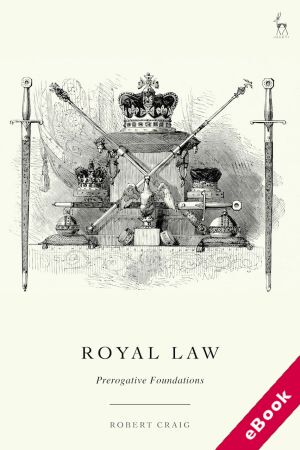
The device(s) you use to access the eBook content must be authorized with an Adobe ID before you download the product otherwise it will fail to register correctly.
For further information see https://www.wildy.com/ebook-formats
Once the order is confirmed an automated e-mail will be sent to you to allow you to download the eBook.
All eBooks are supplied firm sale and cannot be returned. If you believe there is a fault with your eBook then contact us on ebooks@wildy.com and we will help in resolving the issue. This does not affect your statutory rights.
This book argues that all non-statutory powers of the Crown are royal prerogative powers and asserts that the Crown does not possess or exercise any 'third source' powers, common law powers or 'Ram doctrine' style freedoms.
It takes as its starting point AV Dicey's definition that the royal prerogative comprises all non-statutory rights, powers, duties, and immunities of the Crown. And it goes on to argue that the famous alternative definition given by Blackstone, that prerogative powers are only those powers that are exclusive to the Crown, must be reconsidered.
The book states that the legal powers of the Crown that appear to resemble private law powers such as ex gratia payments are in fact rooted in the prerogative powers of administration and justice. It explains that the latter is also the original source of legal authority and legitimacy of common law judicial decisions. Common law is, or was, royal law. Third source of judicial authority, a higher 'common law' does not exist. There are only two ultimate sources of jurisdictional authority in this country: statute and prerogative.
It states that Wade's definition of prerogative is wrong. Wade claimed that the Crown has prerogative powers as well as common law powers. The book argues, contra Wade, that the Crown has no common law powers. Nor does it have any 'third source freedoms' as suggested by Harris. If this is correct, then recent case law considering third source powers must be reconsidered as examples of judicial regulation of prerogative powers, including an often-overlooked prerogative power to administer the realm.